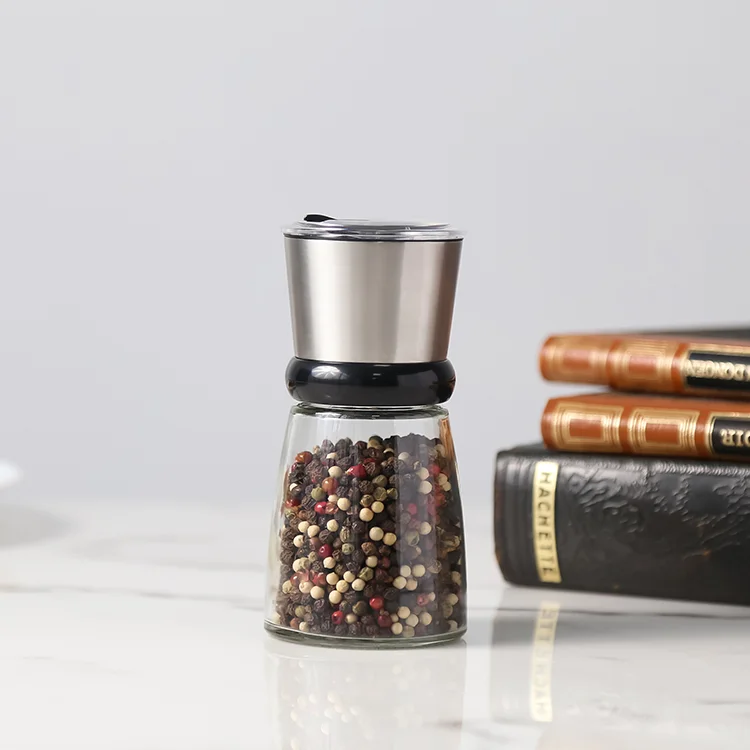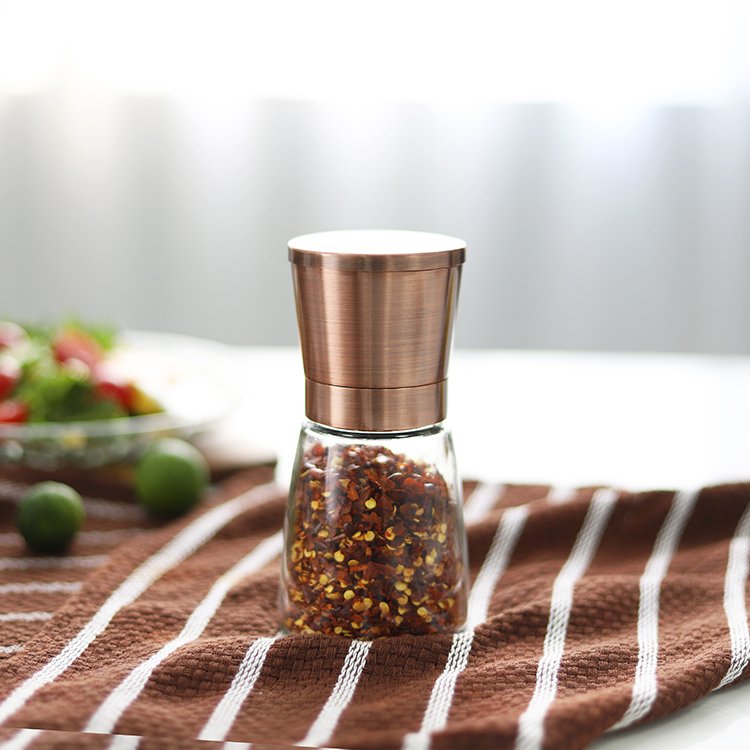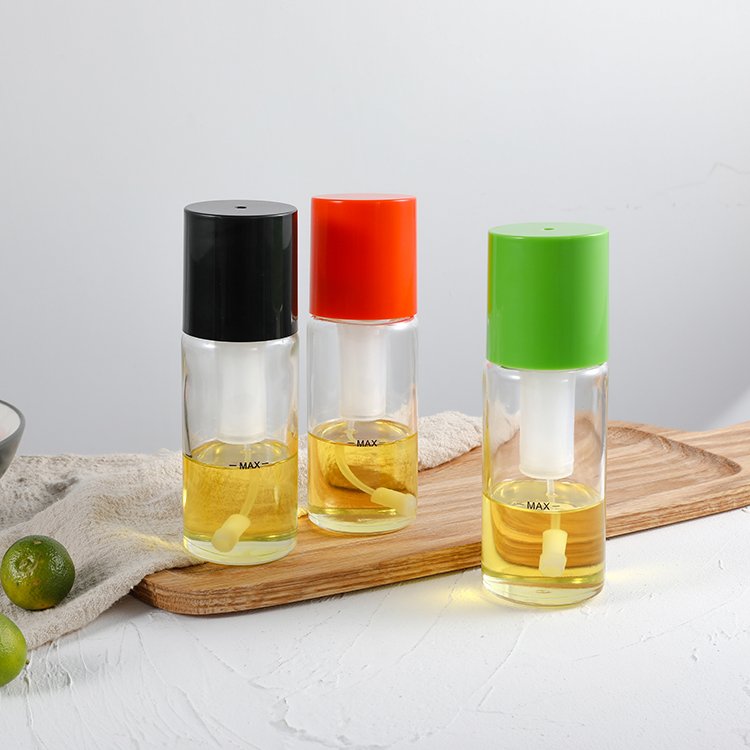
You want a glass oil vinegar cruet that stands up to daily use and keeps oil and vinegar fresh. Look for sturdy glass that resists vinegar acidity and preserves oil flavor. Drip-free spouts stop messes, while airtight seals prevent leaks. Choose a cruet with easy cleaning, comfortable handling, and the perfect size for your oil and vinegar needs.
Material and Build Quality in a Glass Oil Vinegar Cruet
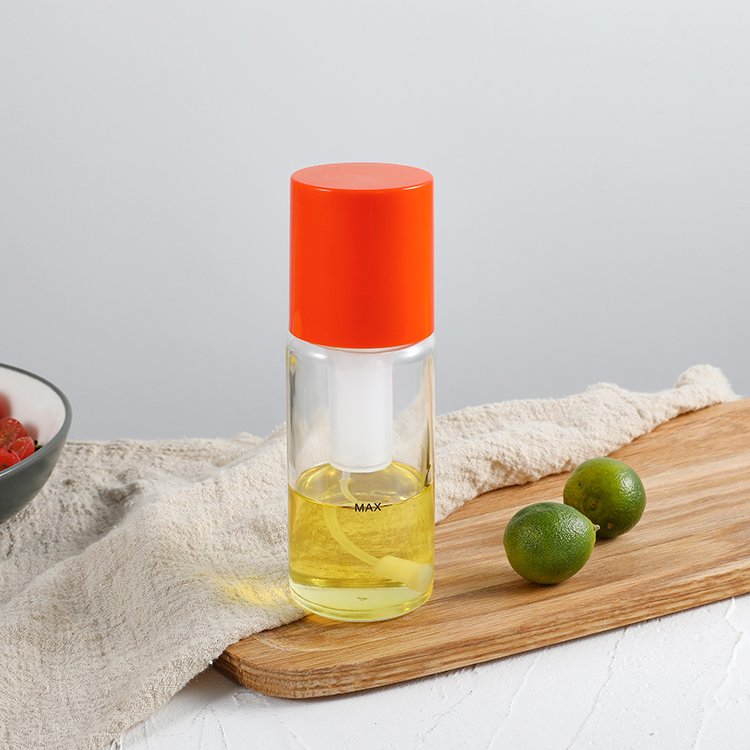
Why Glass is Ideal for Oil and Vinegar
When you choose oil and vinegar bottles made of glass, you protect your oil and vinegar from light, heat, and air. Glass keeps oil and vinegar fresh and tasting great. You avoid flavor changes because glass is chemically inert. Glass oil and vinegar bottles do not leach chemicals or odors, so your vinegar stays pure. Glass is airtight, which means less oxygen reaches your oil and vinegar. This helps prevent spoilage and keeps your oil and vinegar bottles ready for use. Glass is also fully recyclable, making it a smart choice for eco-conscious kitchens. You can see the level of oil and vinegar inside, so you know when to refill.
- Glass protects oil and vinegar from light and heat.
- Glass keeps vinegar flavor pure.
- Glass oil and vinegar bottles are easy to clean and maintain.
Types of Glass and Their Benefits
You find several types of glass used for oil and vinegar bottles. Dark glass bottles block up to 99% of UV light, keeping oil and vinegar fresh for longer. Borosilicate glass offers high durability and chemical resistance, so your vinegar stays safe. The table below compares common materials for oil and vinegar bottles:
| Material | Durability | UV Protection | Flavor Preservation | Weight |
|---|---|---|---|---|
| Dark glass bottles | Sturdy if thick | Blocks 99% UV light | Excellent | Heavier |
| Borosilicate glass | Highly durable | Blocks UV | Excellent | Moderate |
| Plastic | Less durable | Some protection | Can affect flavor | Light |
| Stainless steel | Very durable | Blocks all light | Excellent | Heavy |
Dark glass oil and vinegar bottles help preserve taste and nutrition. Borosilicate glass keeps vinegar safe and fresh. Glass oil and vinegar bottles do not absorb odors, so you enjoy pure oil and vinegar every time.
Durability and Thickness Considerations
You want oil and vinegar bottles that last. Thick glass resists breaking and stands up to daily use. Borosilicate glass is especially strong, so your vinegar stays safe even with frequent handling. Glass oil and vinegar bottles with sturdy construction offer better quality and longer life. You can clean thick glass oil and vinegar bottles in the dishwasher without worry. Choose oil and vinegar bottles with a solid feel for the best quality and safety. You enjoy fresh oil and vinegar every time you use your bottles.
Tip: Always check the thickness of your oil and vinegar bottles. Thicker glass means better durability and safer storage for vinegar and oil.
Spout and Olive Oil Dispenser Design
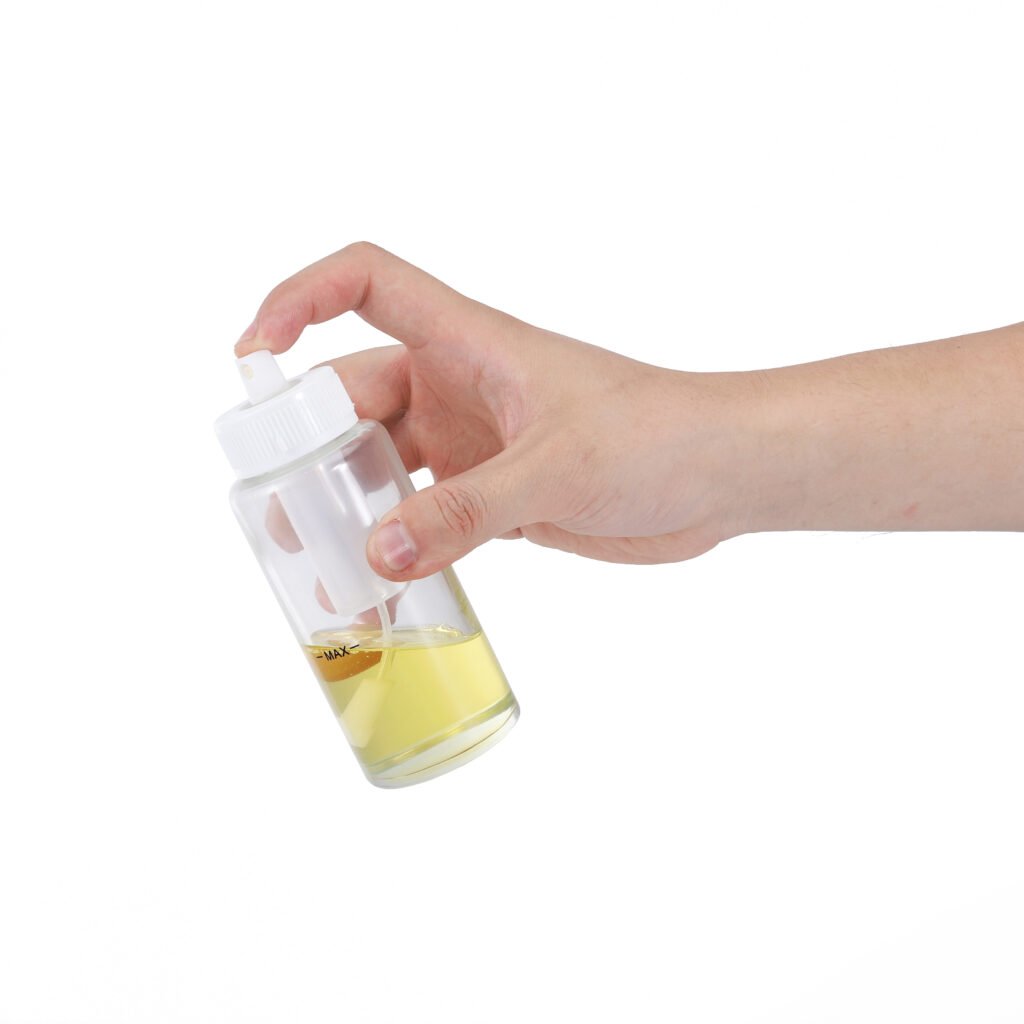
Drip-Free Pouring Features
A quality olive oil dispenser should give you a clean pour every time. Drip-free spouts help you avoid sticky bottles and messy countertops. When you use a cruet with a well-designed spout, you keep your oil and vinegar fresh and your kitchen tidy. Some spouts have a folded lip that stops drips before they reach the bottle. Others use a special design that prevents oil and vinegar from running down the side. You want a glass oil dispenser that stays clean and easy to handle, even after many uses.
Tip: Choose an olive oil dispenser with a spout that does not have a hinged flip-top lid. This design helps prevent drips and keeps your cruet easy to clean.
Precision and Control When Dispensing
You need control when you pour oil and vinegar. The right olive oil dispenser lets you add just the right amount to your salad or pan. Different spout designs affect how much control you have:
- Spouts with separate air intakes give you a smooth, steady stream of oil and vinegar.
- Built-in air intakes can clog and cause the olive oil dispenser to pour unevenly.
- Hinged lids often lead to drips and make the cruet slippery.
- Spouts without hinged lids, like those on some OXO models, allow for precise pouring and less mess.
A good glass oil dispenser gives you confidence every time you use it.
Comfort and Ease of Use
Comfort matters when you use your olive oil dispenser daily. The best cruet fits your hand and feels secure, even if your hands are wet from vinegar or oil. Look for these ergonomic features:
| Ergonomic Feature | Description and Benefit |
|---|---|
| Ergonomic Grip | Comfortable handling reduces hand fatigue. |
| Wide Opening | Easy refilling and cleaning, no funnel needed. |
| Silicone Top | Secure grip, even with greasy hands. |
| Non-Drip Spout | Keeps your kitchen clean by preventing leaks. |
| Automatic/Gravity Lid | Opens with a tilt for one-handed use and better hygiene. |
| Compact Design | Fits in your hand and saves space in your kitchen. |
A well-designed olive oil dispenser makes every use simple and enjoyable. You get the most from your oil and vinegar with the right cruet.
Seal and Leak Prevention in Oil and Vinegar Cruets
Types of Seals, Lids, and Stoppers
When you choose a glass oil and vinegar cruet, you want a seal that keeps your oil and vinegar fresh and prevents leaks. Different types of lids and stoppers offer unique benefits. The table below shows common options and how they help you achieve a tight seal:
| Type of Closure | Material(s) | Sealing Mechanism & Effectiveness | Typical Use & Notes |
|---|---|---|---|
| Glass Stoppers | Glass, silicone/rubber | Precise, airtight seal; preserves freshness and aroma; fragile | Elegant bottles; handle with care |
| Natural Corks | Natural cork | Compressible, tight seal; slight oxygen ingress | Traditional bottles; easy to remove |
| Synthetic Corks | Plastic, agglomerated cork | Consistent, tight seal; less oxygen variability | Reliable for frequent use |
| Plastic Screw Caps | Plastic, liner | Strong, leak-proof seal when tightened | Quick to use; common for condiments |
| Swing Tops | Rubber/plastic, wire clamp | Leak-proof, tight seal; easy to open and close | Great for frequent access |
| Metal Caps | Aluminum, tin, liner | Impermeable, tight seal; corrosion resistant | Protects from oxygen and light |
| Silicone/Rubber Stoppers | Silicone, rubber | Flexible, tight seal; prevents drips and leaks | Ideal for oil and vinegar spouts; colorful and decorative |
You should always check out the lids’ seals before buying. Tight-fitting lids and secure stoppers help you keep oil and vinegar fresh and safe from spills. A secure and safe seal protects the flavor and aroma, so you enjoy every drop.
Preventing Spills and Leaks
You want your oil and vinegar cruet to stay clean and mess-free. The best designs use several features to prevent spills and leaks:
- Spill-preventing spout stoppers keep oil and vinegar inside the bottle.
- Black sealed tops help maintain freshness and stop leaks.
- Easy-pour spouts control the flow and reduce mess.
- Stainless-steel spouts add durability and leak resistance.
- Collar designs catch drips and prevent rings on your counter.
- High-quality borosilicate glass resists breaking and keeps the seal tight.
- Glazed interiors protect freshness and reduce the need for frequent refills.
A tight seal means you avoid sticky bottles and wasted oil and vinegar. You keep your kitchen clean and your ingredients fresh. Always look for secure lids and stoppers that fit tightly and prevent leaks. This way, you enjoy the full flavor and freshness every time you use your cruet.
Best Practices for Proper Sealing
Ensuring a Tight Seal Every Time
You want your glass oil vinegar cruet to keep oil and vinegar fresh and safe. Follow these best practices for proper sealing to get the best results:
- Always use airtight glass containers with tight-fitting lids. This prevents air from entering and keeps your oil and vinegar from spoiling.
- Center the lid on the rim and press down firmly. If your cruet has a screw-on lid, turn it clockwise until snug, but do not over-tighten.
- Make sure both the container and lid are clean, dry, and free from damage before sealing. Dirt or moisture can weaken the seal.
- For extra protection, you can add a thin layer of food-grade silicone around the rim or use beeswax wraps to fill any small gaps.
- Store your cruet in a cool, dry place away from sunlight and humidity. This helps the seal last longer and protects the contents.
- Check the seal regularly for signs of wear or leaks. Replace damaged gaskets or lids right away.
Tip: Dark glass cruets offer extra protection by blocking light, which helps preserve oil and vinegar quality.
Maintenance Tips for Longevity
Proper care extends the life of your cruet and keeps your oil and vinegar tasting great. Here are some best practices for proper sealing and maintenance:
- Hand wash your glass cruet to keep it clean and sanitary.
- Wipe off any spills or drips right away, especially if your cruet has bamboo or metal parts.
- Avoid soaking bamboo components in water to prevent cracking or mold.
- Use your cruet only for oils and vinegars. Avoid highly acidic or thick liquids that can damage the container.
- Store your cruet away from heat sources and avoid sudden temperature changes.
- Keep the cruet in a dark place to protect the contents from light.
- Use oil within one to two months after opening to maintain freshness.
By following these steps, you help your cruet last longer and keep your oil and vinegar at their best.
Ease of Cleaning and Maintenance
Dishwasher Safe vs. Hand Washing
You want oil and vinegar bottles that are easy to clean. Some bottles are dishwasher safe, which saves you time and effort. You can place them on the top rack and let the machine do the work. This method works well for most sturdy glass oil and vinegar bottles. However, hand washing gives you more control and helps protect delicate or decorated bottles. When you clean your bottles by hand, use a slightly damp, lint-free cloth for gentle wiping. Choose a mild detergent or a diluted vinegar solution to avoid damaging the glass. For stubborn spots, a soft toothbrush or artist’s brush with baking soda works well. Avoid harsh abrasives, especially on decorated oil and vinegar bottles, to keep them looking new.
Tip: Always test new cleaning methods on a small area first to protect your oil and vinegar bottles.
Removable Parts for Thorough Cleaning
Oil and vinegar bottles with removable parts make cleaning much easier. You can take apart the spouts, lids, and stoppers to reach every corner. This helps prevent bacteria and stops bacterial growth inside the bottle. Follow these steps to clean your bottles thoroughly:
- Empty the cruet and rinse with warm water to remove oil.
- Soak the bottle in warm soapy water for several hours to break down residue.
- Use a bottle brush for the inside, focusing on narrow necks and bottoms.
- Rinse well with warm water to remove all soap.
- Fill the bottle with equal parts white vinegar and water, let it sit for 15 minutes, then rinse.
- For stubborn odors, add baking soda and scrub again.
- Dry completely to prevent bacteria and mold.
You should clean your bottles on a regular basis to keep them fresh and safe. Regular cleaning keeps your oil and vinegar bottles free from bacteria and ensures they stay easy to clean for daily use.
Size and Capacity for Oil and Vinegar
Choosing the Right Size for Your Needs
When you select oil and vinegar bottles, size matters for both convenience and freshness. Traditional Italian-style glass oil and vinegar bottles often come in 9-ounce and 17-ounce sizes. The smaller 9-ounce bottle works well if you use vinegar less often or want to keep small amounts fresh. The 17-ounce size fits most households, giving you enough oil and vinegar for regular cooking without constant refilling. Many people find that a 17-ounce oil and vinegar bottle balances ease of use, storage, and freshness. This size also helps you maintain the flavor of your oil and vinegar by reducing the risk of spoilage. You can use these bottles for table service or daily cooking, and they are usually dishwasher safe for easy cleaning. Choosing the right size helps you enjoy the best freshness and flavor every time you reach for your oil and vinegar.
Storage and Space Considerations
The capacity of your oil and vinegar bottles affects how well they fit in your kitchen. You want to match the bottle size to your storage space and how often you use vinegar. The table below shows how different capacities suit various needs:
| Capacity Range | Household Size / Use Case | Suitability and Benefits |
|---|---|---|
| Small (around 100ml) | Individuals or sampling oils | Fits compact spaces, ideal for minimizing waste and keeping oil and vinegar fresh |
| Medium (250-300ml) | Most home kitchens, everyday use | Balanced size, easy to handle, less frequent refills, fits standard kitchen storage |
| Large (500ml+) | Large families or frequent cooks | Needs more storage space, reduces refills, best for high usage, keeps freshness when used quickly |
If you have a small kitchen, a compact oil and vinegar bottle saves space and keeps your vinegar fresh. Medium bottles work best for most kitchens, offering a good balance between storage and freshness. Large bottles suit big families or anyone who uses oil and vinegar often. No matter the size, proper storing oil and vinegar helps preserve both freshness and flavor.
Aesthetics and Fit for Your Kitchen
Style and Design Options
You want your olive oil dispenser to look good and work well in your kitchen. Many modern kitchens feature matte black glass bottles with stainless steel pour spouts. These bottles add a sleek touch and match many appliances. Tall neck designs give your olive oil dispenser an elegant and modern look. You can choose from several sizes, such as 350ml, 500ml, or 700ml, to fit your cooking habits. Minimalist shapes dominate the market, making your olive oil dispenser easy to handle and pleasing to the eye. Refillable and leak-proof features combine style with practicality. Stainless steel pour spouts and funnels not only improve usability but also keep your olive oil dispenser looking contemporary.
- Matte black glass bottles with stainless steel pour spouts
- Tall neck designs for elegance
- Multiple size options for different needs
- Minimalist and sleek shapes
- Refillable and leak-proof features
Tip: Choose an olive oil dispenser with a design that matches your kitchen style and makes pouring easy.
Matching Your Kitchen Decor
You want your olive oil dispenser to blend with your kitchen decor. Many people prefer dispensers with classic glass shapes or eco-friendly materials. Sleek, minimalist designs fit well in modern kitchens, while timeless styles suit rustic or traditional spaces. Dual-chamber olive oil dispensers add convenience and visual interest. Wide mouths or removable spouts make cleaning simple and keep your dispenser looking fresh. Trusted brands offer olive oil dispensers that serve as both practical tools and attractive decor pieces. When you select a dispenser, balance style and function to enhance your kitchen’s look and make daily cooking easier.
Common Mistakes to Avoid with a Glass Oil Vinegar Cruet
Overlooking Practical Features
You might focus on looks and forget how important practical features are for oil and vinegar bottles. Some common mistakes include choosing a cruet without a drip-proof spout or ergonomic grip. This can lead to spills, greasy hands, and wasted vinegar. If you pick a bottle without a wide opening, you will struggle to refill or clean it. Not all dispensers fit every liquid. Thick oils need slim spouts, while thinner vinegar pours better from a wider spout. When you ignore flow control, you risk pouring too much and losing flavor. Transparent glass helps you see when you need to refill, so you never run out during cooking. If you skip these features, you lose comfort and efficiency in your kitchen.
- Overfilling the bottle can cause spills and faster oxidation, which reduces freshness and shelf life. Leave about 20% space at the top.
- Using the wrong type of dispenser for oil and vinegar leads to mess and waste.
- Forgetting to seal the bottle properly allows air in, which can spoil the vinegar and affect flavor.
Ignoring Cleaning Requirements
Skipping regular cleaning is one of the most common mistakes with oil and vinegar bottles. If you do not clean your cruet often, residue builds up and can change the flavor of your vinegar. Bacteria may grow inside, especially if you forget to seal the bottle properly. Removable parts make cleaning easier, but you must take them apart and wash each piece. Storing bottles in unsuitable conditions, such as near heat or sunlight, can also cause vinegar to spoil faster. Always check for leftover oil or vinegar before refilling. Clean bottles keep your vinegar tasting fresh and safe for your family.
Tip: Clean your oil and vinegar cruet every week to prevent buildup and keep the flavor pure.
Prioritizing Style Over Function
You may want a stylish cruet to match your kitchen, but function matters most for oil and vinegar. Some integrated designs look modern but are hard to clean and refill. If you choose style over features like airtight seals or dark glass, you risk losing freshness and flavor. Storing bottles in unsuitable conditions, such as open shelves with lots of light, can shorten the shelf life of vinegar. The best oil and vinegar cruets combine ergonomic shapes, secure lids, and materials that protect flavor. When you balance style and function, you enjoy both beauty and performance in your kitchen.
When you choose a glass oil vinegar cruet, focus on durability, practicality, and ease of use.
- Precision pour spouts and airtight seals make each cruet mess-free and hygienic.
- Transparent glass lets you monitor contents, while sleek designs add style.
A glass oil vinegar cruet blends function and elegance, enhancing your kitchen experience.
FAQ
How often should you clean your glass oil vinegar cruet?
You should clean your cruet every week. Regular cleaning prevents residue buildup and keeps your oil and vinegar tasting fresh.
Tip: Use warm water and mild soap for best results.
Can you store other liquids in a glass oil vinegar cruet?
You can store other liquids like soy sauce or salad dressings. Avoid thick or acidic liquids that may damage the cruet or affect flavor.
What size cruet works best for daily cooking?
A 250-300ml cruet fits most kitchens. This size gives you enough oil or vinegar for daily use and helps keep ingredients fresh.



